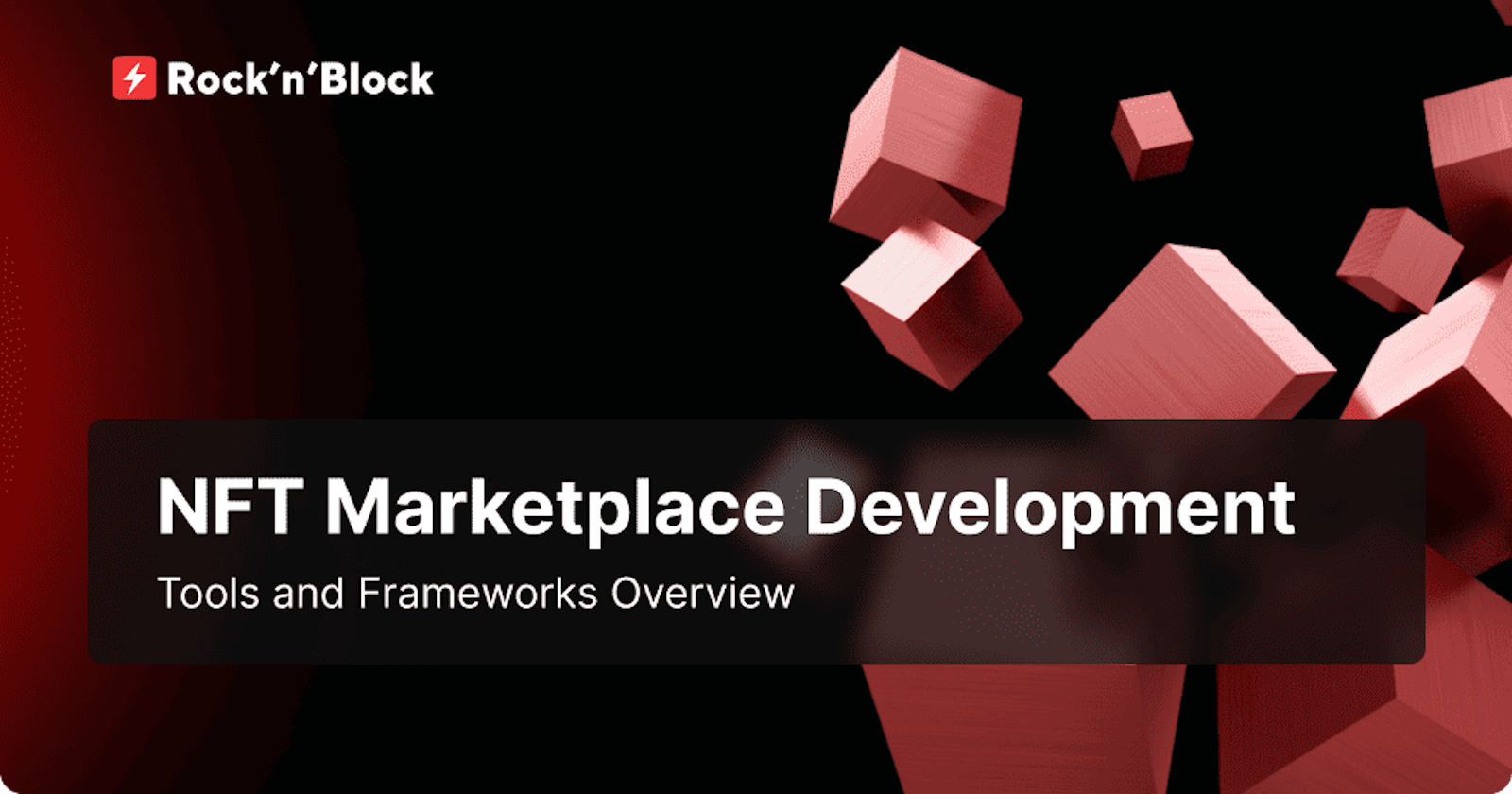Welcome to an enlightening journey into the dynamic realm of NFT marketplace development. With increasing demand for NFTs, the development of robust and feature-rich NFT marketplaces is becoming critical. This article explores the world of NFT marketplace development, highlighting the necessary tools and frameworks that enable developers and entrepreneurs to create vibrant, safe, and adaptable platforms.
☄️ Read our full guide to learn more!
Blockchain Platforms for NFTs
The rise of Non-Fungible Tokens (NFTs) is closely tied to blockchain technology, notably Ethereum. Ethereum's smart contract capabilities paved the way for NFT creation and trading through protocols like ERC-721 and ERC-1155. Despite its success, Ethereum faced scalability issues, prompting exploration of alternatives.
Alternatives Considered:
1. Binance Smart Chain (BSC)
2. Solana
3. Flow
Choosing a Platform
When selecting a blockchain for NFT marketplace development, factors such as security, decentralization, scalability, and community support should be considered. Each platform has unique strengths, catering to specific requirements and use cases in the NFT space.
Smart Contract Development Frameworks and Tools
In the NFT space, smart contracts are essential for creating, managing, and exchanging digital assets. Two key development tools, Truffle and Hardhat, offer distinct advantages. Truffle streamlines development on Ethereum with built-in support for standards like ERC-721. Hardhat provides flexibility and adaptability for developers, catering to evolving Ethereum requirements.
Other Frameworks:
1. Embark
2. Brownie
3. Waffle
Choosing the right framework is critical for NFT developers. Whether it's the robust Truffle, flexible Hardhat, or alternatives like Embark, Brownie, or Waffle, these tools simplify smart contract creation and deployment, driving progress in the NFT sphere.
Decentralized Storage Solutions
In NFT marketplace development, decentralized and secure storage is crucial. IPFS provides decentralized storage using a peer-to-peer protocol, ensuring file immutability. Arweave introduces the "permaweb," a permanent and tamper-proof decentralized storage solution. When choosing a storage solution, consider factors like security, decentralization, cost, scalability, and community support for a robust infrastructure.
Frontend Development Frameworks
In NFT project development, a seamless UI is crucial. React.js and Vue.js are popular for their modularity, while Ethers.js facilitates Ethereum Blockchain interaction. Web3.js integration ensures decentralized features, allowing smooth smart contract interactions in NFT marketplaces.
Frameworks:
1. React.js
2. Vue.js
3. Ethers.js
Web3.js Integration: Bridges traditional web and web3, enabling wallet connections, NFT viewing, and transactions in line with decentralization principles.
In summary, React.js, Vue.js, and Ethers.js are key tools in NFT development. Web3.js enhances decentralization, while balancing aesthetics and functionality is crucial for a competitive NFT marketplace UI.
Wallet Integration Tools
Seamless integration with web3 wallets is vital for NFT marketplace development. Two key tools, MetaMask and WalletConnect, offer distinct features.
MetaMask
Secure Wallet Management for ETH transactions.
Browser Compatibility with Chrome, Firefox, and Brave.
Direct Transactions for an enhanced user experience.
WalletConnect
QR Code Scanning for secure mobile-web connections.
Multi-Device Support for seamless transitions.
Multi-Wallet Connection for versatile interactions.
Supporting Multiple Wallet Options:
NFT marketplace developers should consider integrating wallets like Trust Wallet and Coinbase Wallet to enhance user convenience and accommodate diverse user preferences.
Cryptocurrency Payment Processors for NFT Transactions
Considerations for Payment Gateway Integration:
1. Security: Ensure user financial information is kept secure when integrating payment gateways. Use secure and encrypted connections to prioritize security for your NFT marketplace development.
2. User Experience: Ensure a seamless and intuitive payment process. Minimize steps and provide clear instructions to enhance the overall user experience.
3. Regulatory Compliance: Be aware of and comply with relevant financial regulations when integrating traditional payment gateways. This is essential for maintaining legal and regulatory standards.
Security Tools
Ensuring NFT marketplace security is paramount for protecting digital assets and user trust. Explore key security tools like MythX and OpenZeppelin, along with best practices for smart contract integrity in NFT marketplace development.
MythX:
Offers advanced security analysis for smart contracts, identifying vulnerabilities and potential exploits.
OpenZeppelin:
Foundational framework for secure smart contract development, providing a library of tested components.
Best Practices for NFT Marketplace Security:
1. Code Audits: Regular independent reviews and audits by security experts.
2. Multi-Signature Wallets: Adding extra security through multiple approvals for transactions.
3. Gas Limit Controls: Setting optimal gas limits to prevent potential attacks.
Scalability Solutions for NFT Marketplace Development
Scalability is crucial in NFT marketplace development. Explore Layer 2 solutions like Optimistic Rollups and zk-Rollups, along with NFT-specific initiatives like Immutable X and Polygon.
Layer 2 Solutions:
1. Optimistic Rollups: Execute off-chain transactions, reducing congestion and lowering costs.
2. Zk-Rollups: Use cryptographic proofs for efficient transaction processing without compromising security.
NFT-Specific Initiatives:
1. Immutable X: Specifically designed for NFTs, offering instant transactions on the Ethereum network.
2. Polygon: A Layer 2 solution with a sidechain infrastructure for quicker and cost-effective NFT transactions.
Choosing the Right Solution:
1. Transaction Speed and Cost: Consider implications for a smooth user experience.
2. Compatibility: Ensure compatibility with the broader blockchain ecosystem for interoperability.
3. Security Measures: Prioritize smart contract audits to safeguard NFT assets.
Interoperability Solutions for NFT Marketplace Development
In NFT marketplace development, interoperability is key. Explore cross-chain solutions like Polkadot and Cosmos for seamless communication between blockchains.
1. Polkadot: Facilitates quick asset and data transfer via parachains linked to a relay chain.
2. Cosmos: Offers scalable and flexible interoperability through a hub-and-zone model.
Cross-Chain NFT Transfers: Asset bridging enables NFT transfers, enhancing liquidity and reaching a broader audience.
In conclusion, tools like Polkadot and Cosmos shape the future of NFT marketplace development, ensuring flexibility and connectivity across blockchains.
Conclusion
The NFT marketplace development landscape abounds with opportunities, and its tools and frameworks represent the foundation for defining the success of decentralized ecosystems. Importantly, selecting the right NFT development company remains vital. Their mastery guarantees not just the platform's technical proficiency, but also its capacity to adapt, innovate, and flourish in the competitive NFT realm. The path to a successful NFT marketplace starts with a deliberate choice of a development partner, which serves as the entry point to a future where digital assets redefine ownership and expression.
